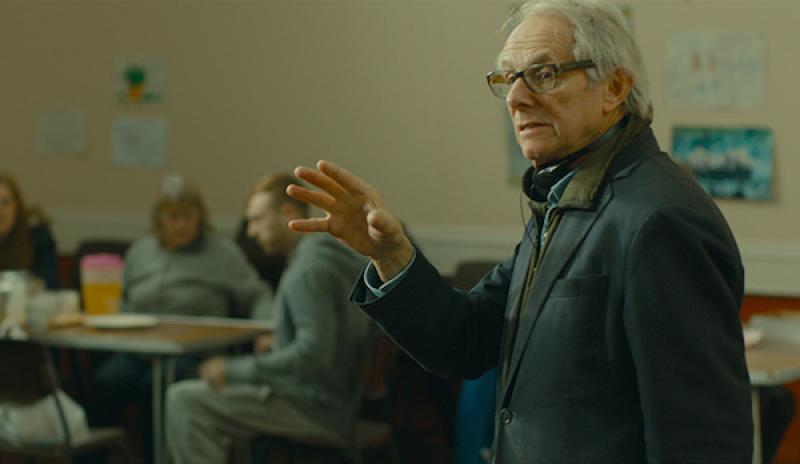Versus: The Life and Films of Ken Loach | reviews, news & interviews
Versus: The Life and Films of Ken Loach
Versus: The Life and Films of Ken Loach
An intimate documentary about the unstoppable veteran director

The release of Louise Osmond’s biographical film about the director Ken Loach, who turns 80 on 17 June, has been timed to perfection. Twelve days ago, Loach’s I, Daniel Blake won him his second Palme d’Or. He came out of retirement to make it after the Conservatives won the General Election last year. “Bastards,” he calls them, with a schoolboy-ish smile, at the beginning and end of the documentary.
Except in the first half of the Thatcher ’80s, Tory policies have specialised in eliciting Loach’s fiercely oppositional cinema – so have anti-socialist Labour policies. For 53 years, he has been British film and TV’s undislodgeable thorn in the side of institutionalised selfishness and greed.
Gabriel Byrne characterises him as a medieval knight who would respectfully kill an opponent by severing a vein
He has directed film after film that supports the rights of ordinary people and empathizes with the jobless, the homeless, the colonised, and others socially disenfranchised. He has frequently focused his anger on the betrayers within: callous welfare workers (Cathy Come Home; Ladybird, Ladybird), neglectful or bullying teachers or relatives (Kes, Family Life), treacherous union officials (The Rank and File, Questions of Leadership), political turncoats at times of crisis (Days of Hope, Land and Freedom, The Wind That Shakes the Barley); and working-class predators of their own (Raining Stones, Sweet Sixteen, The Angels’ Share). Yet humor, song and romance invariably warm his fiction films.
A man of will, conviction, and extraordinary modesty, Loach probably had to have his arm twisted before he agreed to be the subject of a documentary. Given the decreasing share of wealth and concern for working-class people globally, the filmmaker who has championed their rights more than any other over the last half-century may have felt it would be worth revisiting those of his works that were adulterated, delayed, censored, canceled, or vilified by the right-wing.
 In fact, Versus reports on only three of Loach’s sabotaged projects, all from the Thatcher era. Channel 4 scuppered Questions of Leadership (1983), his discussion-driven four-parter probing the conduct of union leaders who had betrayed the rank and file. Which Side Are You On? (1985), a documentary about art made by miners during the 1984-85 strike, was dumped by London Weekend Television because it incorporated images of police brutality. Loach says LWT had no integrity. Melvyn Bragg, who commissioned the film for The South Bank Show, defends the broadcaster’s need to protect its franchise. (Pictured above, Loach wins the Palme d'Or at Cannes, May 2016).
In fact, Versus reports on only three of Loach’s sabotaged projects, all from the Thatcher era. Channel 4 scuppered Questions of Leadership (1983), his discussion-driven four-parter probing the conduct of union leaders who had betrayed the rank and file. Which Side Are You On? (1985), a documentary about art made by miners during the 1984-85 strike, was dumped by London Weekend Television because it incorporated images of police brutality. Loach says LWT had no integrity. Melvyn Bragg, who commissioned the film for The South Bank Show, defends the broadcaster’s need to protect its franchise. (Pictured above, Loach wins the Palme d'Or at Cannes, May 2016).
Another blow was delivered by the Royal Court Theatre’s cancellation of Jim Allen’s Perdition, which Loach was directing, shortly before its first performance in January 1987. Allen’s script about a deal made between Adolf Eichmann and Zionist leaders in Nazi-occupied Budapest incensed contemporary Zionists and columnists primed to tar Allen and Loach as anti-Semitic. In Versus, Loach accuses Max Stafford-Clark, the Royal Court’s artistic director, of cowardice for halting the production; the latter regrets both putting the play on and taking it off. Cast-member Gabriel Byrne, who witnessed Loach’s response to Stafford-Clark’s decision, characterises him as a medieval knight who, when roused, would respectfully kill his opponent by severing a vein.
The film critic Andrew Sarris named his book The John Ford Movie Mystery for the boozing, bullying director’s ability to craft poetic, beautiful Westerns and other films. Equally mysterious is the gentle, self-deprecating Loach’s harbouring of a spine of steel (as the late Jim Allen put it), a set of inflexible principles, and a capacity for ruthlessness. Tony Garnett, his producer partner in the BBC years, suggests his friend’s “absolute” self-belief owes much to his mother’s devotion to him and that his “infantile omnipotence” served him well as a director who is otherwise benign. Garnett has said elsewhere he wouldn’t have had the actor playing Kes’s headmaster cane four schoolboy actors, as Loach did in the quest for verisimilitude.
 Produced by Loach and Rebecca O’Brien’s Sixteen Films for the BFI and the BBC, Versus makes no claims for impartiality. It is unusually candid for a tribute to an artist, however. Loach frankly describes the 1971 car crash that killed his grandmother-in-law and his and his wife Lesley’s second son, five-year-old Nicholas, and of his permanent loss of happiness. His youngest son, director Jim Loach, recollects how his father’s succession of suppressed projects alerted him to his fallibility. Obliged to make commercials when he couldn’t get films financed, Loach feels he acted unethically. There’s no flinching from the truth here.
Produced by Loach and Rebecca O’Brien’s Sixteen Films for the BFI and the BBC, Versus makes no claims for impartiality. It is unusually candid for a tribute to an artist, however. Loach frankly describes the 1971 car crash that killed his grandmother-in-law and his and his wife Lesley’s second son, five-year-old Nicholas, and of his permanent loss of happiness. His youngest son, director Jim Loach, recollects how his father’s succession of suppressed projects alerted him to his fallibility. Obliged to make commercials when he couldn’t get films financed, Loach feels he acted unethically. There’s no flinching from the truth here.
Loach’s memories piece together his journey as the son of a Tory-voting factory foreman who laughed until he cried at the stage comics the Loaches saw on their Blackpool holidays (the loosely structured narrative is connected by too many impressionistic shots of the resort’s modern amusements.) Oxford law graduate Ken disappointed his parents when he decided to become an actor: the theatre stills of him dressed in period costume or as Brer Fox – actually a large pantomime pooch – won’t have reassured them. He once served as Kenneth Williams’s understudy. One of his daughters thinks it’s apt the director of Up the Junction and Cathy Come Home likes gaudy Hollywood musicals because, she says, “he’s camp, isn’t he?”
“Curious journey people go on,” Loach allows. His is also momentous.
rating
Explore topics
Share this article
Add comment
The future of Arts Journalism
You can stop theartsdesk.com closing!
We urgently need financing to survive. Our fundraising drive has thus far raised £49,000 but we need to reach £100,000 or we will be forced to close. Please contribute here: https://gofund.me/c3f6033d
And if you can forward this information to anyone who might assist, we’d be grateful.

Subscribe to theartsdesk.com
Thank you for continuing to read our work on theartsdesk.com. For unlimited access to every article in its entirety, including our archive of more than 15,000 pieces, we're asking for £5 per month or £40 per year. We feel it's a very good deal, and hope you do too.
To take a subscription now simply click here.
And if you're looking for that extra gift for a friend or family member, why not treat them to a theartsdesk.com gift subscription?
more Film
 Steve review - educator in crisis
Cillian Murphy excels as a troubled headmaster working with delinquent boys
Steve review - educator in crisis
Cillian Murphy excels as a troubled headmaster working with delinquent boys
 Can I get a Witness? review - time to die before you get old
Ann Marie Fleming directs Sandra Oh in dystopian fantasy that fails to ignite
Can I get a Witness? review - time to die before you get old
Ann Marie Fleming directs Sandra Oh in dystopian fantasy that fails to ignite
 Happyend review - the kids are never alright
In this futuristic blackboard jungle everything is a bit too manicured
Happyend review - the kids are never alright
In this futuristic blackboard jungle everything is a bit too manicured
 Robert Redford (1936-2025)
The star was more admired within the screen trade than by the critics
Robert Redford (1936-2025)
The star was more admired within the screen trade than by the critics
 Blu-ray: The Sons of Great Bear
DEFA's first 'Red Western': a revisionist take on colonial expansion
Blu-ray: The Sons of Great Bear
DEFA's first 'Red Western': a revisionist take on colonial expansion
 Spinal Tap II: The End Continues review - comedy rock band fails to revive past glories
Belated satirical sequel runs out of gas
Spinal Tap II: The End Continues review - comedy rock band fails to revive past glories
Belated satirical sequel runs out of gas
 Downton Abbey: The Grand Finale review - an attemptedly elegiac final chapter haunted by its past
Noel Coward is a welcome visitor to the insular world of the hit series
Downton Abbey: The Grand Finale review - an attemptedly elegiac final chapter haunted by its past
Noel Coward is a welcome visitor to the insular world of the hit series
 Islands review - sunshine noir serves an ace
Sam Riley is the holiday resort tennis pro in over his head
Islands review - sunshine noir serves an ace
Sam Riley is the holiday resort tennis pro in over his head
 theartsdesk Q&A: actor Sam Riley on playing a washed-up loner in the thriller 'Islands'
The actor discusses his love of self-destructive characters and the problem with fame
theartsdesk Q&A: actor Sam Riley on playing a washed-up loner in the thriller 'Islands'
The actor discusses his love of self-destructive characters and the problem with fame
 Honey Don’t! review - film noir in the bright sun
A Coen brother with a blood-simple gumshoe caper
Honey Don’t! review - film noir in the bright sun
A Coen brother with a blood-simple gumshoe caper
 The Courageous review - Ophélia Kolb excels as a single mother on the edge
Jasmin Gordon's directorial debut features strong performances but leaves too much unexplained
The Courageous review - Ophélia Kolb excels as a single mother on the edge
Jasmin Gordon's directorial debut features strong performances but leaves too much unexplained

Comments
I saw it yesterday. IT'S
I saw it yesterday. IT'S BRILLIANT!!!!